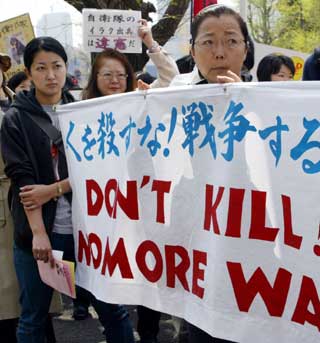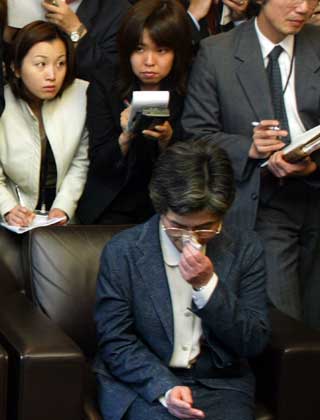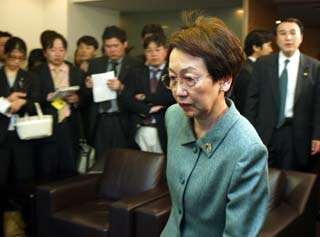|

Japanese Prime Minister Junichiro Koizumi
arrives at his official residence in Tokyo on April 9, 2004. The
kidnapping of three Japanese citizens by an armed group in Iraq has put
Koizumi in a tight spot as it is certain to fuel calls for a review of a
controversial Japanese troop deployment there. (Reuters)

Demonstrators holding a banner call for the
withdrawal of Japanese forces from Iraq in front of the Lower House of the
parliament in Tokyo April 9, 2004. Calls for Japanese Prime Minister
Junichiro Koizumi to bring home Japan's non-combat troops are growing
after the kidnapping of three Japanese civilians. [Reuters]

A demonstrator holds a sign demanding Japan to
withdraw its troops from Iraq in front of Prime Minister Junichiro
Koizumi's official residence in Tokyo April 9, 2004. [Reuters]

Naoko Imai, mother of Noriaki Imai, 18, one of
three Japanese civilians kidnapped in Iraq, puts a handkerchief to her
nose during a meeting with Foreign Minister Yoriko Kawaguchi in Tokyo
April 9, 2004. Families of the kidnapped urged the government to withdraw
its troops from Iraq. [Reuters]

Japanese Foreign Minister Yoriko Kawaguchi
enters a meeting room for talks with family members of three Japanese
civilians kidnapped in Iraq, in Tokyo April 9, 2004. Families of the
kidnapped urged the government to withdraw its troops from Iraq.
[Reuters]

Undated file photos show the three Japanese
civilians taken hostage on April 8, 2004 by an Iraqi group. From left to
right, Noriaki Imai, 18, Nahoko Takato, 34, and Soichiro Koriyama, 32. A
previously unknown Iraqi group released a video of the hostages on
Thursday and vowed to "burn them alive" if Japanese troops did not leave
Iraq within three days. [Reuters]
|